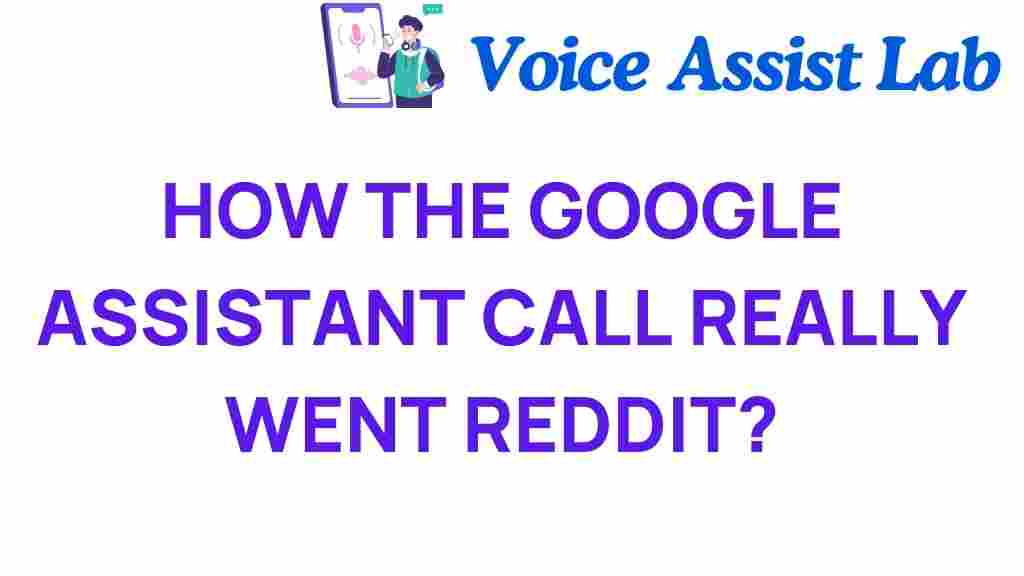Unveiling the Truth: How the Google Assistant Call Really Went Down
In the ever-evolving world of AI technology and digital assistants, Google Assistant has made significant strides in enhancing user experience. Recent discussions, particularly on platforms like Reddit, have shed light on an incident that raised numerous privacy concerns about how the Google Assistant operates. This article aims to unravel the details surrounding the Google Assistant call, diving deep into its implications on voice recognition technology, user privacy, and overall user experience.
The Incident that Sparked Controversy
In early 2023, a video surfaced showcasing Google Assistant making a phone call to schedule an appointment. This demonstration, which aimed to highlight the advancements in voice recognition technology, left many users in awe but also sparked a flurry of discussions about the ethical implications and potential privacy concerns surrounding AI technology.
Understanding Google Assistant’s Functionality
Google Assistant is designed to help users manage their tasks, find information, and control smart home devices through voice commands. Its ability to understand natural language and context has made it a powerful tool in the realm of digital assistants.
- Voice Recognition: Google Assistant employs sophisticated algorithms to interpret and respond to user commands.
- Natural Language Processing: The technology enables the assistant to understand context and nuances in conversation.
- Continuous Learning: Google Assistant improves over time by learning from user interactions, enhancing its responsiveness and accuracy.
However, the recent call incident raised questions about how much autonomy users are willing to grant such technology and what measures are in place to protect their privacy.
The Mechanics of the Call
To understand how the Google Assistant call was executed, it’s important to break down the process involved:
Step 1: Initiating the Call
The process begins when a user requests Google Assistant to make a call. This can be done through a simple voice command such as, “Hey Google, call the nearest hair salon.”
Step 2: AI Interpretation
Upon receiving the command, Google Assistant processes the information using its voice recognition technology. It identifies the intent behind the request and searches for the relevant contact information or service provider.
Step 3: Making the Call
Once the appropriate number is determined, Google Assistant initiates the call. This is where the AI’s capabilities shine, as it can engage in a conversation with the recipient, simulating human-like interactions.
Step 4: Handling Responses
During the call, the Google Assistant uses advanced natural language processing to understand the responses from the other party, allowing it to carry out the conversation effectively.
Step 5: Ending the Call
After the appointment is scheduled or the call is concluded, the Assistant summarizes the interaction and provides feedback to the user.
Privacy Concerns Raised
The seamless execution of this process has not come without its drawbacks. Following the viral video, many users expressed concern regarding:
- Data Collection: Users are wary of how much personal data is collected during such interactions.
- Transparency: There were questions about whether users are adequately informed about when and how their data is being used.
- Consent: The notion of consent became a hot topic, especially regarding the other party on the call who may not have been aware they were speaking to an AI.
As the discussion unfolded on Reddit and other platforms, it became clear that while users appreciate the convenience of AI, they also demand accountability and transparency from tech companies.
Troubleshooting Google Assistant Calls
If you’re facing issues with Google Assistant or want to ensure your privacy settings are intact, follow these troubleshooting tips:
Check Your Voice Match Settings
Ensure that Google Assistant recognizes your voice accurately by configuring the Voice Match feature in the settings. This can help improve the accuracy of voice recognition.
Review Your Privacy Settings
Regularly check your privacy settings to manage what data Google Assistant collects. You can do this by:
- Opening the Google Home app.
- Navigating to Account settings.
- Selecting “Google Assistant” and then “Your data in the Assistant.”
Limit Data Sharing
If you’re concerned about privacy, consider limiting the data Google Assistant can access. Disable features that you don’t use or need.
Feedback and Improvements
If you encounter issues or have suggestions, use the feedback feature to inform Google about your experience. This can lead to improvements in the service and enhance overall user experience.
Conclusion: The Future of Google Assistant and AI Technology
The incident involving the Google Assistant call has opened up a vital conversation about the balance between innovation and user privacy. As AI technology continues to evolve, it is crucial for tech companies to prioritize transparency and user consent.
While the advancements in voice recognition and the capabilities of digital assistants like Google Assistant are impressive, they must come with robust privacy measures to ensure users feel safe and informed. The discussions on platforms like Reddit reflect a growing awareness among consumers who value their data and privacy.
As we look to the future, the integration of AI into our daily lives will undoubtedly deepen. However, it must be a journey taken with care, respect for user experience, and strong safeguards in place to champion privacy and ethics in technology.
This article is in the category Innovations and created by VoiceAssistLab Team
